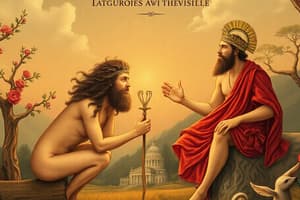Podcast
Questions and Answers
What is the foundation myth of Rome?
What is the foundation myth of Rome?
The foundation myth of Rome is the legend of Romulus and Remus and the tale of Aeneas.
How does the 753 BC date square with the archaeological record?
How does the 753 BC date square with the archaeological record?
The 753 BC date is not supported by the archaeological record.
Who were the Etruscans and what impact did they have on the early Romans?
Who were the Etruscans and what impact did they have on the early Romans?
The Etruscans were the first 'superpower' of the Western Mediterranean who developed the earliest actual cities in Europe. They had a significant impact on the early Romans.
What happened to the last Etruscan king of Rome in 509 BC?
What happened to the last Etruscan king of Rome in 509 BC?
Who were the Romans and what tribal people did they encounter?
Who were the Romans and what tribal people did they encounter?
Explain the significance of the foundation myth of Rome and how it contributed to the Romans' perception of their city's origins.
Explain the significance of the foundation myth of Rome and how it contributed to the Romans' perception of their city's origins.
Describe the role of the Etruscans in the early history of Rome and their impact on Roman civilization.
Describe the role of the Etruscans in the early history of Rome and their impact on Roman civilization.
Discuss the events that led to the end of the Roman monarchy and the establishment of the Roman Republic in 509 BC.
Discuss the events that led to the end of the Roman monarchy and the establishment of the Roman Republic in 509 BC.
Explain the historical significance of the 753 BC date in relation to the foundation of Rome and its archaeological record.
Explain the historical significance of the 753 BC date in relation to the foundation of Rome and its archaeological record.
Identify the tribal people that the Romans encountered and interacted with during their early history.
Identify the tribal people that the Romans encountered and interacted with during their early history.
Flashcards are hidden until you start studying




